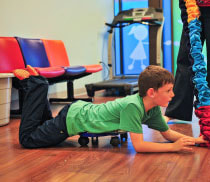Milestones for 18 months
What most children do at this age: 18 months
|
Self-Care Skills
·Eats a varied diet ·Naps 1 time per day ·Begins to show discomfort when wet/soiled ·Improved bowel/bladder – begins to stay dry for longer periods ·Can help undress ·Eats with a spoon ·Drinks from a cup ·Is able to chew food in a coordinated fashion ·Enjoys making messes in different mediums (food, water, etc) Communication Skills ·Knows body parts ·Has at least 15 -20 words ·Makes animal sounds ·Points to show something interesting or something he wants ·Shakes head no ·Can follow 1 step directions without any gestures ·Protests when upset ·Requests more |
Social and Play Skills
·Separation anxiety increases ·Engages in simple pretend play such as feeding a doll ·May cling to caregivers in new situations ·Enjoys looking at photos ·Imitates adult routines like housework ·Looks for hidden things ·Engages in symbolic play with real objects – like talking on the telephone Fine Motor Skills ·Scribbles ·Holds an object with one hand and manipulates with the other ·Inserts 2 or more shapes in sorter or foam board ·Likes to pull push and dump things ·Turns pages in a book ·Stacks 2-3 blocks Gross Motor Skills ·Uses riding toys without pedals ·Tries walking up/down stairs holding rail or hand, placing both feet on each step ·Walks independently in all directions, begins to run ·Throws a ball ·Stoops and stands back up ·Bends over and looks through his legs ·Pushes, pulls, carries while walking ·Starts to climb into a chair |
Contact us for a screening or evaluation if your child:
|
·Doesn’t bring hands to mouth
·Doesn’t respond to loud sounds ·Can’t hold head up when pushing up when on tummy |
·Doesn’t smile at people
·Doesn’t watch things as they move ·Doesn't properly latch onto bottle or breast when feeding |
Information on milestones compiled from: TheraNotes by Belinda Anderson; Peabody Developmental Motor Scales Second Edition, Pediatric Therapy Partners website, and the Centers for Disease Control and Prevention website.



